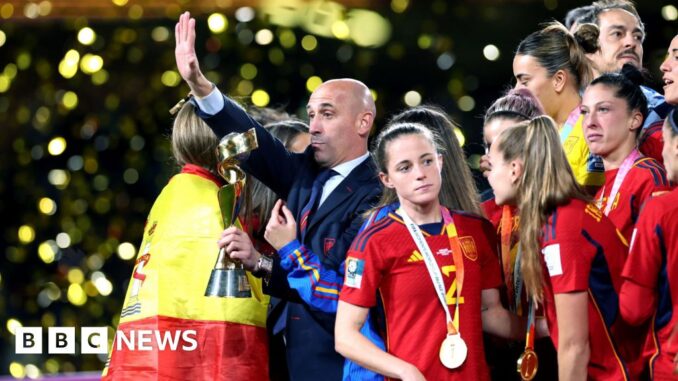
Ex-Spain Football Boss Luis Rubiales on Trial Over World Cup Kiss
The world of football often transcends the sport itself, penetrating political, social, and cultural realms. The trial of Luis Rubiales, the former president of Spain’s football federation, is a stark example of this convergence. Rubiales is set to face significant legal challenges stemming from a controversial incident following Spain’s historic victory over England in the 2023 FIFA Women’s World Cup. This article will delve into the details of the case, its implications for Spanish football and societal attitudes towards women, and provide insights into the broader discussions around sexism, consent, and accountability.
Overview of the Incident
On August 20, 2023, following Spain’s exhilarating World Cup win, Rubiales kissed player Jenni Hermoso on the lips during the medal ceremony. This act, witnessed by millions, quickly spiraled into a public controversy that has since led to legal proceedings. While Rubiales claimed the kiss was consensual, Hermoso firmly stated otherwise, asserting that the kiss was imposed upon her without her consent. This discrepancy has ignited intense debate over issues of consent and respect for women in positions of power.
The Legal Proceedings
Luis Rubiales is facing trial for sexual assault, with prosecutors seeking a one-year prison sentence for the kiss. Additionally, he has been accused of coercion, where he allegedly attempted to pressure Hermoso into publicly stating that the kiss was consensual. This charge could elevate his potential prison time to a year and a half if convicted. As the trial progresses, it is essential to consider the societal implications of the case, especially in the context of #MeToo movements and increasing awareness around consent.
Hermoso’s participation as a witness on the opening day of the trial underscores the personal ramifications of this case, as she travels from Mexico, where she currently plays for the club Pachuca. The trial is set to conclude by February 19, 2024, and the nation watches closely as it unfolds.
Co-defendants in the Trial
Rubiales is not alone in facing legal scrutiny; three of his colleagues have also been named in the trial. Jorge Vilda, the coach of the Spanish women’s national team, along with Rubén Rivera, the federation’s former head of marketing, and Albert Luque, the former sporting director, are also accused of collusion in the alleged coercion of Hermoso. Each of these men has denied wrongdoing, positioning themselves against the allegations presented by prosecutors.
Societal Reactions
The incident has triggered widespread protests and calls for Rubiales’s resignation. It has permeated political discussions, with Prime Minister Pedro Sánchez commenting that Rubiales’s actions highlight the ongoing struggle for gender equality and respect between men and women. This sentiment reflects a broader governmental commitment to reforming laws concerning gender and sexual consent, aiming to foster a safer environment for women in all sectors, including sports.
Historical Context
Isabel Fuentes, a pioneering figure in women’s football, lamented the overshadowing of Spain’s monumental World Cup victory by the scandal. Fuentes, reflecting on her own experiences as one of the first women to represent Spain in football back in the 1970s, noted the progress that women have made in the sport, while also acknowledging the deep-seated sexism which has plagued the sport historically. The Spanish dictatorship of Francisco Franco, she recalled, actively discouraged women’s participation in sports, relegating them to the sidelines.
This clash of past and present—where players like Fuentes had to fight for recognition and respect for women’s soccer—is now juxtaposed against this scandal involving a public figure in the sport.
A Shift in Attitudes
Interestingly, while figures like Fuentes reflect on the past, younger players, such as Belén Peralta of third-division side Olimpia Las Rozas, emphasize the progress made in recent years. She has noted a change in social perceptions towards women in football, highlighting a growing acceptance and recognition of female athletes. “When I was younger, girls playing football was kind of strange,” Peralta recalled. “But nowadays, saying ‘I’m a footballer’ is cool.”
Her teammate, Andrea Rodríguez, agrees, stating that while isolated incidents of sexism still exist, the overall attitudes towards women’s football have shifted positively. This generational divide ensures that while the Rubiales case garners significant media attention, it does not overshadow the advancements made in women’s sports.
Conclusion: The Road Ahead
The trial of Luis Rubiales represents more than just a legal battle; it is emblematic of a larger cultural shift regarding how society views women, consent, and accountability in positions of power. As the world watches the proceedings, there lies an opportunity for growth, dialogue, and perhaps, a reevaluation of longstanding norms in the realm of sports and beyond.
Resources and Further Reading
For readers interested in staying informed about the allure of women’s football, community reactions, and developments in this case, here is how you can connect with players, clubs, and relevant discussions surrounding this topic:
| Players and Clubs | Player Name | Club | Social Media |
|---|---|---|---|
| Jenni Hermoso | Pachuca (Mexico) | ||
| Belén Peralta | Olimpia Las Rozas | ||
| Andrea Rodríguez | Olimpia Las Rozas |
Related Social Media Posts and Videos
In conclusion, the trial of Luis Rubiales is set against a backdrop of a changing societal landscape where gender equality, respect, and the concept of consent are now more crucial than ever. The outcome of this case may indeed influence future interactions between men and women in sports, potentially reshaping the culture surrounding football in Spain and beyond. As this chapter unfolds, the resilience and determination of women in the sport continue to shine through, reminding us of the progress and the battles that still lie ahead.
Feature image Credit: Google.com/www.bbc.com
